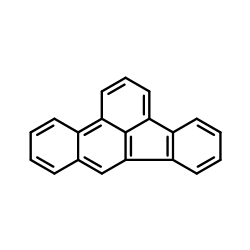BENZO(B)FLUORANTHENE

BENZO(B)FLUORANTHENE structure
|
Common Name | BENZO(B)FLUORANTHENE | ||
|---|---|---|---|---|
| CAS Number | 205-99-2 | Molecular Weight | 252.309 | |
| Density | 1.3±0.1 g/cm3 | Boiling Point | 467.5±12.0 °C at 760 mmHg | |
| Molecular Formula | C20H12 | Melting Point | 163-165 °C(lit.) | |
| MSDS | Chinese USA | Flash Point | 228.6±13.7 °C | |
| Symbol |



GHS02, GHS07, GHS08 |
Signal Word | Danger | |
| Name | benzo[b]fluoranthene |
|---|---|
| Synonym | More Synonyms |
| Density | 1.3±0.1 g/cm3 |
|---|---|
| Boiling Point | 467.5±12.0 °C at 760 mmHg |
| Melting Point | 163-165 °C(lit.) |
| Molecular Formula | C20H12 |
| Molecular Weight | 252.309 |
| Flash Point | 228.6±13.7 °C |
| Exact Mass | 252.093903 |
| LogP | 6.40 |
| Vapour Pressure | 0.0±0.6 mmHg at 25°C |
| Index of Refraction | 1.887 |
| InChIKey | FTOVXSOBNPWTSH-UHFFFAOYSA-N |
| SMILES | c1ccc2c(c1)-c1cccc3c1c-2cc1ccccc13 |
| Stability | Stable. Incompatible with strong oxidizing agents. |
CHEMICAL IDENTIFICATION
HEALTH HAZARD DATAACUTE TOXICITY DATA
MUTATION DATA
|
| Symbol |



GHS02, GHS07, GHS08 |
|---|---|
| Signal Word | Danger |
| Hazard Statements | H225-H319-H336-H350-H412 |
| Supplemental HS | Repeated exposure may cause skin dryness or cracking. |
| Precautionary Statements | P201-P210-P273-P280-P304 + P340 + P312-P308 + P313 |
| Hazard Codes | T,N,Xn,F,Xi |
| Risk Phrases | 45-50/53-67-65-38-11-36-39/23/24/25-23/24/25 |
| Safety Phrases | S53-S45-S60-S61-S62-S26-S16-S9-S36/37-S7 |
| RIDADR | UN 2811 6.1/PG 3 |
| WGK Germany | 3 |
| RTECS | CU1400000 |
| Packaging Group | III |
| Hazard Class | 6.1(b) |
| HS Code | 2902909090 |
| HS Code | 2902909090 |
|---|---|
| Summary | 2902909090 other aromatic hydrocarbons。Supervision conditions:None。VAT:17.0%。Tax rebate rate:9.0%。MFN tariff:2.0%。General tariff:30.0% |
|
QSPR modeling of octanol/water partition coefficient for vitamins by optimal descriptors calculated with SMILES.
Eur. J. Med. Chem. 43 , 714-40, (2008) Simplified molecular input line entry system (SMILES) has been utilized in constructing quantitative structure-property relationships (QSPR) for octanol/water partition coefficient of vitamins and org... |
|
|
Concentrations, Trends, and Air-Water Exchange of PAHs and PBDEs Derived from Passive Samplers in Lake Superior in 2011.
Environ. Sci. Technol. 49 , 13777-86, (2015) Polycyclic aromatic hydrocarbons (PAHs) and polybrominated diphenylethers (PBDEs) are both currently released into the environment from anthropogenic activity. Both are hence primarily associated with... |
|
|
New hydroxystilbenoid derivatives endowed with neuroprotective activity and devoid of interference with estrogen and aryl hydrocarbon receptor-mediated transcription.
Bioorg. Med. Chem. 19 , 339-351, (2011) We have synthesized a series of new (E) stilbenoid derivatives containing hydroxy groups at ring positions identical or similar to those of trans-resveratrol and bearing one or two bulky electron dona... |
| Benzo[b]fluoranthene |
| 3,4-Benzofluoranthene |
| 2,3-Benzofluoranthene |
| 2,3-Benzfluoranthene,3,4-Benzofluoranthene,3,4-Benz[e]acephenanthrylene |
| EINECS 205-911-9 |
| BENZO(B)FLUORANTHENE |
| MFCD00010582 |
| 2,3-Benzfluoranthene |
| Benzo[e]fluoranthene |
| Benz[e]acephenanthrylene |
| Benzo<b>fluoranthene |
| 2,3-Benzofluoranthrene |
| 3,4-Benzfluoranthene |
| benz(e)acephenanthrylene |
| Benzo[e]acephenanthrylene |

